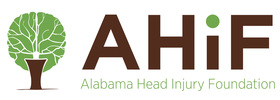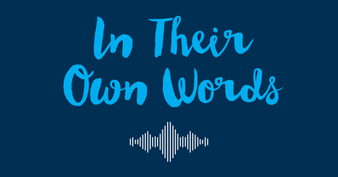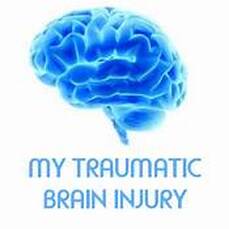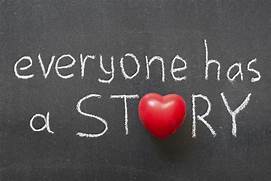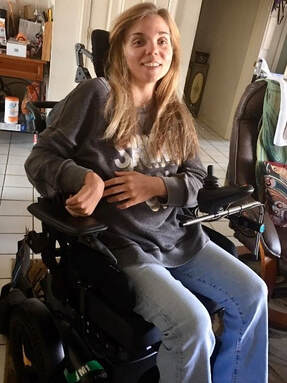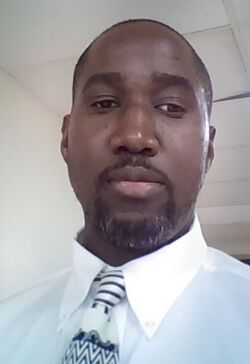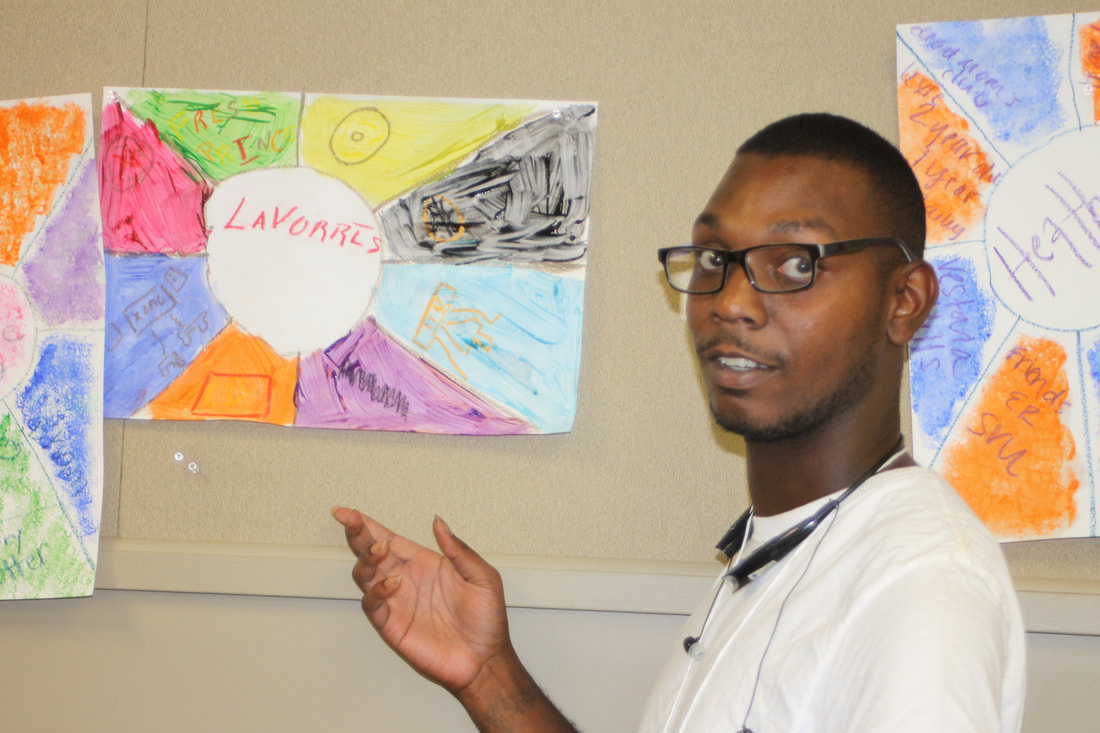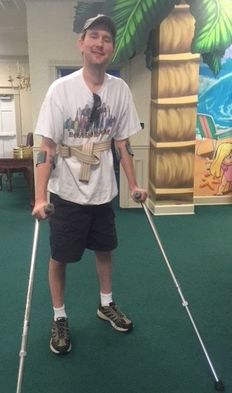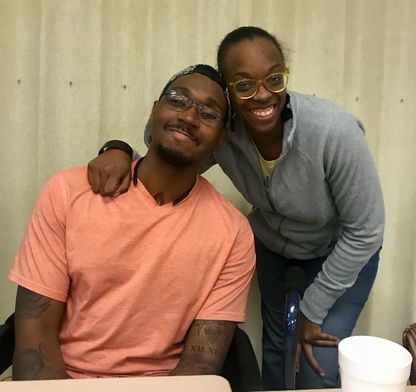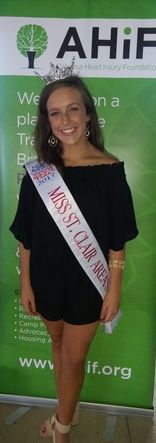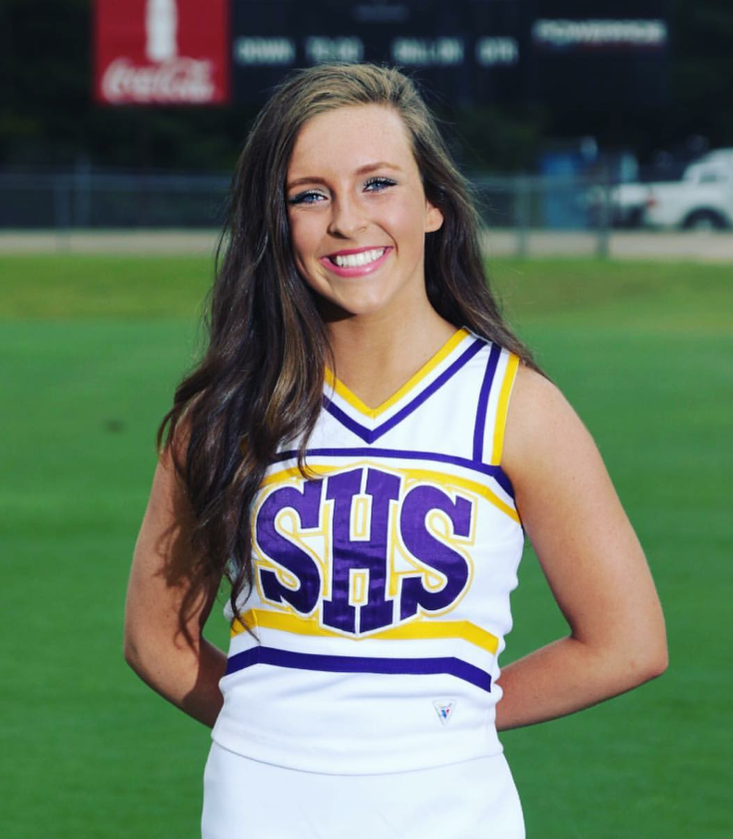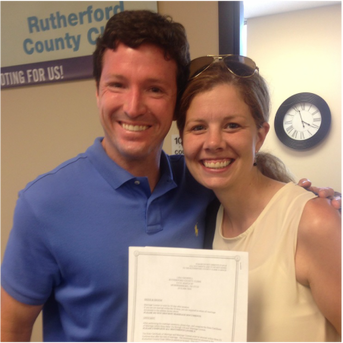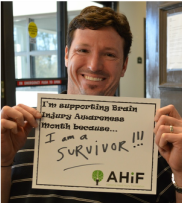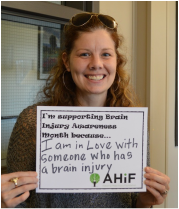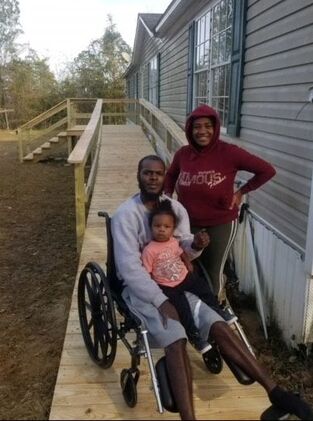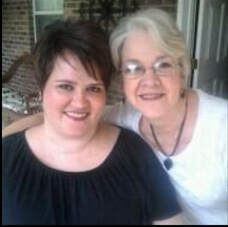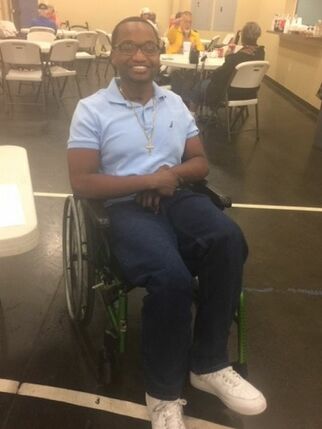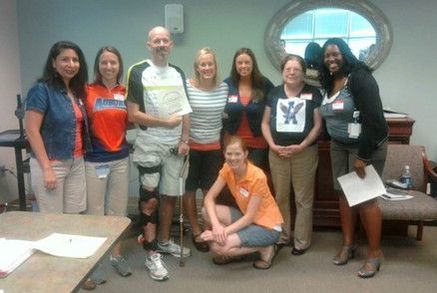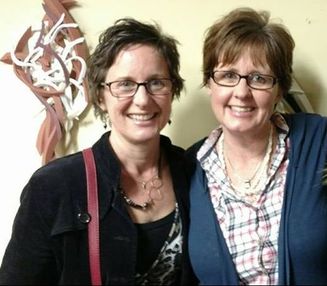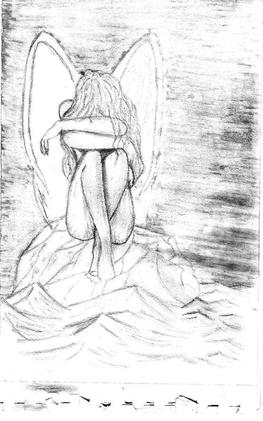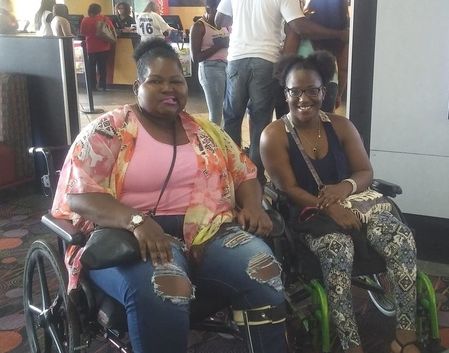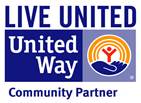Client Testimonies
No matter how hard we try, we can never truly share the details of someone's personal TBI journey better than they can, in their own words. AHIF is so thankful to each client who, either through video or through words, has shared their testimony to help bring awareness to the realities of living with traumatic brain injury.
Dawn's Story
We’ve all been around those people who, no matter what is going on, can always find a way to turn something positive into a negative. Then, there are those special people who, no matter what is going wrong, can take any situation and turn it into a positive. Dawn Lathem is most certainly one of those people who always sees the positive in all situations.
Every opportunity that AHIF identified over the past six months Dawn was willing to give it a try! She was a guest drawer in the |
Amy vs Scott Pictionary Challenge! She was a contestant in our first ever Lip Sync Challenge, where she cleverly sang No Doubt’s “Don’t Speak.” She took part in the 13-week Music Therapy Clinical led by a UA Music Therapy student. She also took part in the UAB We Can Do It Program. The UAB students who worked with Dawn enjoyed her so much that, when they learned her birthday was coming up, bought her some thera-bands and asked us to deliver them to Dawn to use for her exercises! Every Tuesday and Thursday for most of 2020, Dawn would join our Zoom Support Group meetings and bring an instant source of encouragement and positivity to any and every meeting. She took time to get to know each attendee, so much so that she could recognize when they didn’t seem to be themselves and would ask them what was wrong, and always had a positive word of encouragement to offer. Over the past months, we have had some awesome support groups, and some that went off the rails a little bit. No matter what was going on, and how out of control things got...you could always count on Dawn, with that signature smile and compassionate voice…to echo again her encouraging line…It’s All Good! And, when Dawn is around, she is right. It is all good.
Summer's Story
|
Summer is 23 years old, and sustained a traumatic brain injury and spinal cord injury in a car accident in June of 2015. Her injury left her paralyzed on the right side of her body, with memory issues from her TBI, and initially she was told she would never see again. Her recovery has been, and continues to be, a reflection of her fighting spirit, and that of her mother, Anita. Despite the many physical and cognitive effects of her injury, Summer and her family communicated to AHIF early on that, more than anything, she has struggled with feeling alone and not having many friends following her injury. We were immediately interested in trying to find socialization opportunities, but with no “in-person” support group nearby the opportunities were limited…and then came COVID-19.
|
Summer began attending our Zoom support groups. Like most of us…she began a little uncertain of herself, and the meeting platform, but after a few sessions she began to open up and let her light shine. She is now one of the leaders in our group, and her encouragement to others, her positive outlook, her love of music and her sharp wit in poking at other attendees but in a fun and
delightful way, means that everyone looks forward to Summer! Summer was also the champion, and defended her title to win again, in our two competitions of Beat ShAHIFazam…a “name the song” competition based on the TV Game Show Beat Shazam! Summer could not be beaten!
When the University of Alabama and AHIF began discussing the possibility of a 13-week music therapy clinical for Fall 2020, Summer was one of the first people who came to mind. AHIF was able to put together a group of five young women, all strong and confident, and all survivors of a TBI, SCI or both. For weeks, these women have come together with students and faculty from the UA Music Therapy program, and focused on how music can help deal with stress, anxiety, loneliness and other therapeutic benefits. As wonderful as this program has been, perhaps the greatest benefit has been that, as everyone logs on to our Zoom support groups, you can tell a bond has formed with these women, as they greet each other, support each other, and have found friendship in a time when few thought it possible.
When the University of Alabama and AHIF began discussing the possibility of a 13-week music therapy clinical for Fall 2020, Summer was one of the first people who came to mind. AHIF was able to put together a group of five young women, all strong and confident, and all survivors of a TBI, SCI or both. For weeks, these women have come together with students and faculty from the UA Music Therapy program, and focused on how music can help deal with stress, anxiety, loneliness and other therapeutic benefits. As wonderful as this program has been, perhaps the greatest benefit has been that, as everyone logs on to our Zoom support groups, you can tell a bond has formed with these women, as they greet each other, support each other, and have found friendship in a time when few thought it possible.
After COVID shut us in our homes for what felt like months on end, we all looked forward to Summer arriving if, for no other reason, because we could be outside in the sun and warmth. It was something we all looked forward to. For AHIF, Summer came early because, when we switched our support groups to Zoom, we all had the pleasure of meeting Summer…and we all look forward to seeing her and her warmth, just like we do the season she is named after.
Larry's Story
|
Learning how to facilitate a support group using Zoom was not an easy task for anyone at AHIF. For starters…the “start time” seemed to just be a suggestion. Our support groups typically start at 1:00 p.m., but it is usually 1:10 p.m. before things really get going. After just a few sessions…something interesting started to occur. Instead of AHIF staff welcoming everyone to the group…we noticed that Larry, an AHIF client from southwest Alabama, had taken over the job…greeting each guest personally, asking them how they were, and making them feel uniquely welcome to our support group.
Larry had a blood clot removed due to a massive subdural hematoma when he was eleven years old. After the surgery, he had to relearn everything all over again…including how to walk, use his hands, talk, feed himself, etc. It also led to him dealing with speech paralysis for over 20 years.
|
When you meet him, and ask him how he is, you better be ready with your thesaurus to look up the words he shares to describe how he is doing. The one thing you can know for sure is that each of the words will be something positive…because…above all…Larry is a positive person. Just being around him makes you feel better about yourself…and life in general. Larry is actively seeking to return to work and, more than anything, his long-term goal is to use his positive spirit and his story of survival and recovery to become a motivational speaker. If his ability to lift the spirits of each AHIF staff member, and all the other attendees of our support group, is any indication then he is destined for a long and successful career.
Lavorris's Story
Lavorris was a gang member and drug addict who unfortunately made some enemies along the way. He was set up, shot multiple times (head, arms, chest, legs) and left for dead. Miraculously, the staff at DCH Hospital were able to save his life, but he was left with a retracted right arm, clubbed left foot, slurred speech and a host of mental health issues.
Lavorris and his family initially worked with ADRS, and then transitioned to AHIF's West Alabama Resource Coordinator. He expressed a wish to obtain his GED, something he had been told was a waste of time given his memory issues, deficiencies in math and reading, and continued gang affiliations. AHIF worked with Shelton State Community College for special accommodations for Lavorris, special tutors, and worked to disengage Lavorris from his gang activity. AHIF also connected Lavorris with AA, NA, individual counseling and crisis intervention. Lavorris has now passed all but one section of the GED, and is hoping to take his last assessment in Summer 2020. He hopes to one day become a substance abuse counselor! Misty's Story
Misty became an AHIF client in May of 2017, having sustained multiple TBIs. Her first was from a car accident that left her in a coma for 21 days, and then faced with the challenge of having to re-learn all her activities of daily living. When she became an AHIF client, it was in the dire situation of being two weeks from eviction, and therefore also in danger of losing her daughter is she did indeed become homeless.
AHIF worked with Misty to appeal her social security disability ruling, which had been denied two times. We were finally able to get her disability approved, opening the door for social security benefits and insurance, allowing Misty to get an apartment that she could stay in long-term. AHIF also helped find a family member to help Misty manage her finances as we help her work through her struggles with memory, finances and sticking to a daily routine. Tommy's Story
It was July 21, 2011 when Tommy not only lost his independence, but also found himself much like a newborn child dependent on his parents and others for his personal and physical needs. Tommy had been working for 10 years for a trucking company doing welding, when he fell off the top of a trailer. He sustained a severe traumatic brain injury.
Since that date his dad became his full-time caregiver. Two years ago, his dad found AHIF while searching the internet and he and Tommy came to the Mobile weekly support group meeting. Initially, it was a challenge moving from the isolation of home to the social situation of a support group. As he has become more comfortable in this setting, Tommy has expanded his interests and joined Planet Fitness to improve his balance and muscle strength. He admits he was at first hesitant to join in group activities but now enjoys sitting at the table with others. He is striving to become less dependent on his dad, and appreciates the support and encouragement he receives at support group on this journey. Jason's Story
At the Montgomery AHIF support group meeting in November 2017, a new client attended who sustained his traumatic brain injury serving in the military. His grandmother had contacted AHIF earlier in the day to inquire about the support group. She explained that her grandson, 25, had sustained his injury in an automobile accident while on active duty in the Middle East. Jason had been rushed to Walter Reed Medical Center in Arlington, Virginia and had recently been sent home to Prattville, Alabama. As a result of his TBI, Jason still struggles with his speech and has been working on standing independently and learning to eat and chew again.
Jason, his grandmother and his aunt attended that support group meeting. It was our Thanksgiving celebration, so many people brought their favorite dish to share and were encouraged to share things they were thankful for. As his grandmother fixed his plate and other clients began to speak, Jason began to weep. When it came around the room for him to speak, without hesitation, he slowly and carefully rose to his feet and supported himself on his chair. He slowly introduced himself, spoke of his service in the army and time at Walter Reed Medical Center. While this took a very long time, you could have heard a pin drop at the meeting. Jason shared that while he was thankful for his life, he was most thankful for his time in the service and being able to serve his country. He also stated that he was thankful someone brought sweet potato pie. Soon after he shared, group members began to thank him for his service to our country and Jason slowly brought his hand up to his forehead in an effort to salute. His grandmother thanked AHIF for having a support group in which he could now attend and thanked us for "being a blessing". However, we know it was Jason that blessed us that evening. Graci's StoryGraci is a competitive cheerleader living in the Birmingham area. On January 31, 2012, she was practicing a stunt with her fellow cheerleaders where she was the flyer. At the height of this stunt, she was ten feet in the air, when a base supporter did not catch her foot, and she fell to the floor. She immediately lost consciousness. When she woke, she was nauseated, dizzy and had a severe headache. She went to the ER, where they did an MRI. The physician said she could return to practice the next week, but her symptoms persisted. Her mother took her to a pediatrician, who referred her to a neurologist, and she was told she had a traumatic brain injury. For nearly four months, she saw a neuropsychologist every Friday, and was finally able to return to cheering. Today, Graci is a varsity cheerleader, and has adopted traumatic brain injury as her platform competing in the Miss Alabama Outstanding Teen Organization. She is thankful for where she is today, for the recovery she experienced, even though she still has some consequences from her injury. She is thankful to Alabama Head Injury Foundation for the work they do to help her and others like her across our state.
From Nearly Dead to
|
Aubryon's Story
Aubryon was the victim of a shooting in Eufaula by an unknown assailant shortly after he moved to the area. The shooting left Aubryon with a TBI and therefore many physical limitations for movement. He was referred to AHIF by Southeast Health Case Management. Unfortunately, ADRS was unable to assist Aubryon and his family because he did not own his home. However, AHIF's Southeast Resource Coordinator was able to work with the family to help get some medical bills written off and secure some durable medical equipment.
AHIF's Resource Coordinator started making phone calls and found Christian Life Church, whose community mission team raised all the funding to purchase supplies for a wheelchair ramp and built the ramp for Aubryon and his family. They are also excited about the opportunity to now visit Christian Life Church! Patricia's Story
My name is Patricia, and I live in Chatom, Alabama. My daughter's life was spared in a car accident in June 2006, but it left her paralyzed below her chest. She has such a positive attitude and will cheer others when they come to cheer her.
Alabama Head Injury Foundation's respite care program has been a God-send for me. It allows me to prepare my music for our church worship services each Sunday and attend the services with a clear conscience that Bonnie, my daughter, will be taken care of! The Respite Care program allows me to be in the community of faith that fills my spirit for the week, and to receive the mental and physical health that is so badly needed. Dominic's Story
Dominic was in a motor vehicle accident at age 14 and sustained a frontal lobe traumatic brain injury. His injury left him with lingering behavior issues, and thus he spent his teenage years in multiple group homes until AHIF was able to begin working with him at age 21.
Dominic's mother passed away, and he has no siblings and never knew his father. He now considers AHIF to be his "go to" family, and especially AHIF's Southwest Alabama Resource Coordinator. He is a regular attendee of our Mobile County Support Group. AHIF helped him secure disability benefits, and works with him to help manage his ongoing physical, financial and behavioral issues. He has even made friends in support group who now help take him to group and medical appointments! He is now living on his own, at times has been able to work a part-time job, has a bank account, and uses city transport to attend GED classes! He still has many daily challenges and "ups and downs," but is seeking to live as safe and successfully as he can. Bokeem's Story
Bokeem is age 23 and in 2017 he was in a MVC and sustained a brain injury which left him non responsive and dependent on a trach, feeding tube and medical professionals for his daily care. After about 4 months he began to respond and follow simple commands. The hospital began to make plans for his discharge but his mother was at a loss over what to do as her income was the only income for the family and she had to work. She knew he was too young for a nursing home and wanted him home. She was fortunate to have an employer who worked with her to allow her to work shifts while his older brothers and an aunt rearranged their lives to help.
Bokeem began to improve physically with his trach and feeding tube removed. He is wheelchair bound still but he is talking. His mother has worried over his inappropriate remarks but this has improved with time and opportunities for socialization. After much patience and referrals and advocacy efforts, he is now on SSID and a Medicaid waiver and has his aunt as his full time caregiver while mom works. Day programs have been looked into but nothing found yet that is affordable or covered by his insurance. Some months ago Bokeem began coming to our support group each week and he now sits with others playing board games and enjoying others helping him with the games. He is always smiling and is a pleasure to know. His aunt has made her way into our caregiver group and appreciates the positive support of other caregivers! Barrett's Story
For those of you reading this, you know it is hard to share my story in just a few words. In January 2011, I was traveling between customers when I lost control of my truck and hit a tree. I was left with broken bones, partially paralyzed and a traumatic brain injury.
I went to Shepherd Center in Atlanta for five months to continue my recovery, and was walking when I returned to Troy, AL to live with my parents, as my marriage had ended during my recovery. I began to deal with depression and faced many legal issues I didn't know how to handle. I needed an external advocate to help me, and I found Alabama Head Injury Foundation. The local Resource Coordinators, Terrie Causey and now Cindy Woodcox, helped me to own my situation instead of letting it own me. Just a phone call away was someone who would not be patronizing, was empathetic to my situation, and could help me find ANSWERS. Susan & Ellen's Story
In northeast Alabama’s rural Jackson County, AHIF serves two sisters living together. The older sister sustained a traumatic brain injury in 2005 in a car accident, and the younger sister sustained multiple brain injuries following an abusive relationship in her past. Car accidents and domestic violence are among the top five causes of traumatic brain injury in Alabama each year.
These two sisters called AHIF about services in July 2016, specifically mentioning the need for a new ramp for their house, and some safety modifications for their bathroom. AHIF was able to work with other nonprofit agencies in Jackson County to get the home modifications that Susan and Ellen needed. However, in July 2017, the bathtub in the modified bathroom cracked and needed replacement. It was not one of the items that was modified to meet the specific needs of these two brain injury survivors. AHIF staff worked with the sisters to find a bathtub specifically designed with an entry door to help minimize the fall risks for individuals with disabilities or difficulty walking. We were able to find such a produce, but it was far outside their price range. Due to the generosity of donors to AHIF, we were able to provide a bathtub to the sisters, and they called to say thank you and that they were blessed to have AHIF as part of their family. Jaden's StoryJaden is a bright, shy 16 year-old boy who, up until last November, was going to high school and having fun as a normal teenager. On November 30th, he was involved in a horrific car accident, which has left him and his family dealing with a new way of life. Jaden sustained a traumatic brain injury and a spinal cord injury, leaving him paralyzed with only moderate use of his arms. Jaden’s family is his support network, and although they have down days, they have not given up nor allowed themselves to become isolated from society. Jaden has recently returned to high school, and passes his time drawing. He uses his pencil to bring beauty into the world, and to express himself in a very special way. Jaden’s injury changed his thoughts for the future. He wants to be a counselor for people who are going through the same things he did after his accident. He has seen firsthand how a compassionate, warm counselor can help survivors and their families in dealing with catastrophic circumstances. For now, as he begins this new journey in life, he and his family are getting through each day, living their “new normal” and being strong for each other.
|
